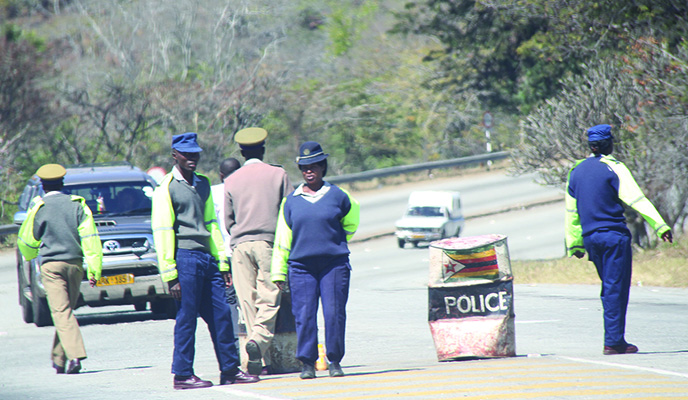By Farayi Machamire
In yet another major setback for Zimbabwe’s international standing, the Zimbabwe National Statistics Agency (ZimStat) yesterday released a damning report in which 10 000 tourists complained about the police — with 500 of them promising never to return to the country again, citing harassment by law enforcement agents.

At the same time, 14 358 tourists also condemned the sorry state of the country’s roads, which they branded as “very poor” in a visitor survey conducted by the government at the country’s 10 ports of exit between July 2015 and June 2016.
This comes as Zimbabwe’s tourist industry, already battered by the country’s poor international political standing, is struggling to attract visitors because of its uncompetitive product offering and the complaints of harassment by police on the country’s roads.
ZimStat’s tourist survey findings come amid the outcry by locals that pervasive, bribe-seeking police roadblocks are making travelling by car in the country an impossible mission.
“Roads were rated poor and very poor by 42,4 percent of visitors. Similarly, police services were rated poor and very poor by 25,1 percent of the visitors.
“Visitors who had no intentions of visiting again or recommending destination Zimbabwe to others were asked for the reasons and the major one cited were high prices (63,2 percent), harassment by police (43,2 percent) and poor infrastructure and other facilities which accounted for 31,1 percent,” the survey concluded.
A cross section of Zimbabweans, including Parliament and the Zimbabwe Tourism Authority (ZTA), has regularly raised serious concerns about the heavy presence of police on the roads, saying it was a hindrance to both the growth of the tourism sector and commerce generally.
Zimbabwe boasts of having some of the world’s most renowned tourist destinations, including the majestic Victoria Falls and scenic Eastern Highlands attractions among many others.
However, poor local infrastructure and the ubiquitous police roadblocks have seen deep-pocketed international tourists giving the country a wide berth, in favour of other regional destinations like South Africa and Mauritius.
“We have observed as Parliament that there is no law concerning roadblocks and they are just being erected willy-nilly.
“Tourists driving from Beitbridge to Victoria Falls on average go through about 20 roadblocks. They have been checked at the border and passed through customs and immigration,” National Assembly Speaker Jacob Mudenda complained last year.
“In Tanzania, road blocks have been reduced from 58 to 15. In Kenya, they used to have 35 police road blocks between Mombasa and Malawi but by 2013 all road blocks had been removed.
“Now you bring an investor from outside and they land at Harare International Airport, they go through Customs and Immigration and just as they leave the airport, where there is our independence banner there is a road block!
“Can this investor be a criminal in that five metres they have travelled? Come on, this does not make sense. Let us not be our own enemies against strengthening the ease of doing business,” Mudenda added.
In a desperate bid to maintain acceptable occupancy levels, one of Zimbabwe’s most popular hotels, Leopard Rock, last year took the unprecedented step of re-imbursing tourists their money which they would have spent on paying traffic fines en route to the hotel.
Last week, the High Court ruled that there was no law that allowed police to confiscate licences and impound vehicles of drivers who refuse to pay spot fines.
In the High Court application filed by Andrew Makunura, who was represented by Tonderai Bhatasara, in which he sought an order barring police from demanding spot fines, and that he be given back his driver’s licence, police made the welcome concession that paying spot fines was optional.
Judge Esther Muremba subsequently ruled that spot fines were illegal.
“In their plea, the defendants (including Home Affairs minister Ignatius Chombo and Chihuri) denied that when the plaintiff failed to pay the spot fine he was detained or compelled to pay it as paying a spot fine is optional to motorists who are willing to do so.
“The defendants averred that spot fines have already been declared to be unconstitutional in terms of the old Constitution and as such they (defendants) have no reason to disrespect the law,” Muremba noted. Daily News






